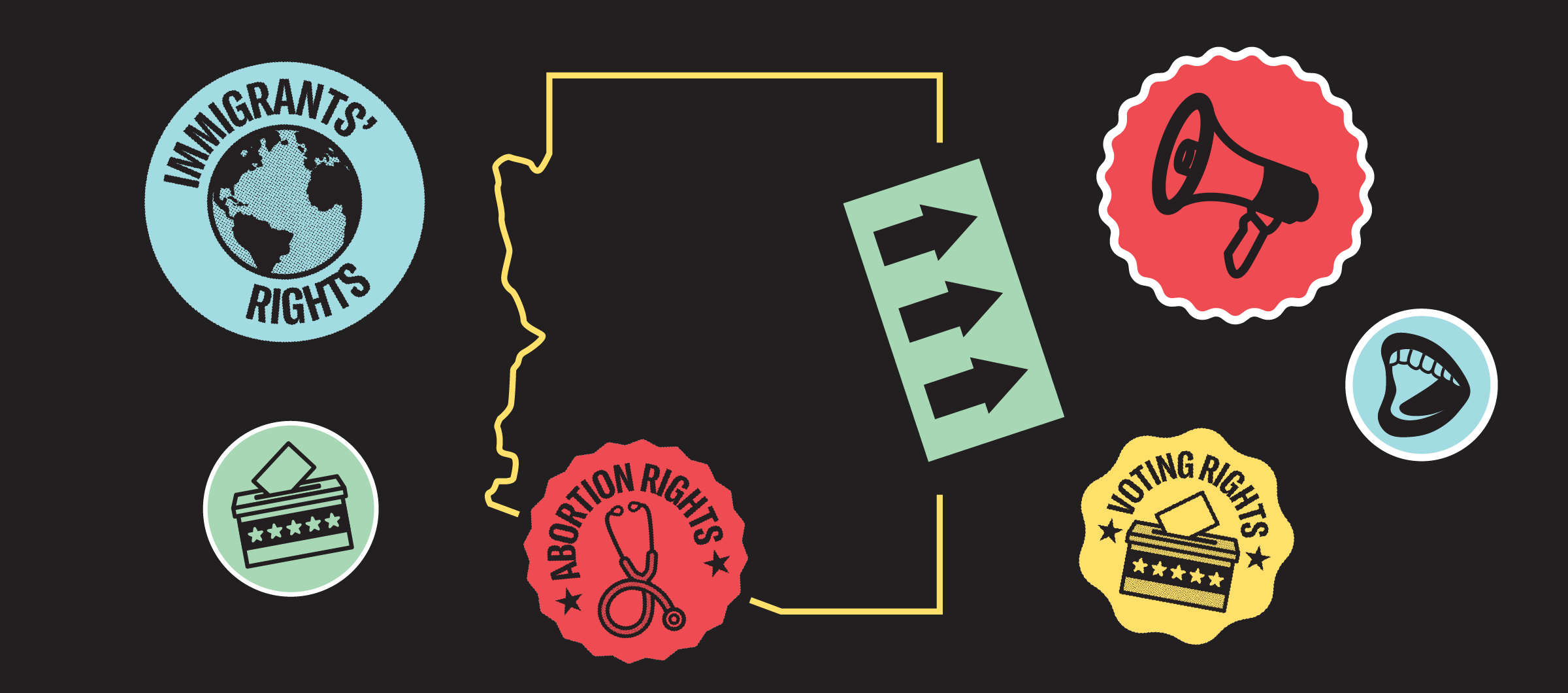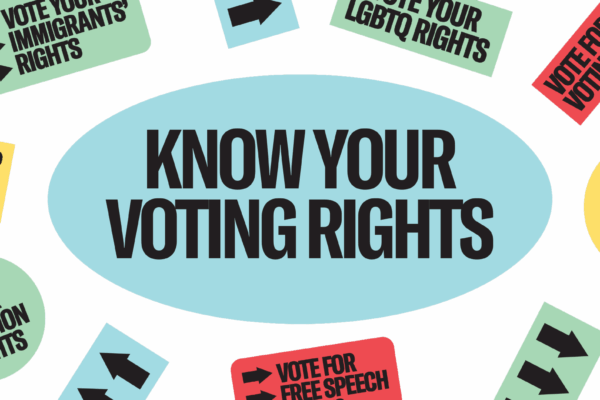Your vote matters, so does starting conversations that encourage others to vote too. Here’s how to talk about the election with your friends and family.
It’s often said that politics and the election shouldn’t be discussed at the dinner table. Like religion or money, it’s too sensitive to bring up in casual conversation. But this election year, there’s far too much at stake. The more often we speak up, the more likely we are to encourage others to vote.
A simple conversation about voting with your friends and family can make all the difference in getting them to the polls. In fact, studies show that a friend-to-friend contact can increase voter turnout by up to 8 percent and have up to two times more impact than a cold call, text, or door knock.
Still cringe at the thought of getting into a sticky conversation? Think about it this way: you can have a real impact by doing something you already do every day — talking to the people you know. Here are three tips to get started!
- Approach these conversations in a way that feels safe and non-confrontational. A safe conversation is anchored in mutual respect and starts from a place of values, so everyone feels comfortable expressing their thoughts and feelings.
- Listen to others’ experiences and acknowledge their point of view. A good conversation, regardless of the topic, can only happen if everyone involved gets to speak their mind and is heard by others, even if they don’t always agree.
- Learn about the issues in Arizona that matter to you, so you can share the facts. When speaking with family and friends, leading with shared values and personal stories can help you make clear what’s at stake.
How to Talk About the Importance of Voting
Our votes are powerful and our democracy thrives when we all have an equal opportunity to vote. As voters, we can support leaders and policies that uphold and protect the right to vote, ensuring that we have a strong representative democracy. Here’s what you can say to find common ground with the people you care about:
- “I think that the right to vote is what makes our democracy work and it’s the foundation that supports all our other rights. Are you registered to vote already?”
- “I believe we need laws that break down the barriers that keep Black, Indigenous, young, and new Arizonans from being able to vote, so everyone gets an equal say in the decisions that affect us all.”
- “We all deserve fair and accessible elections, and for our voice to be heard when we cast our ballot!”
Questions You May Hear
Q: I’ve been hearing so much about voter fraud. Is this a real problem?
A: There is no evidence that the United States has a problem with voter fraud. Many studies have found that voter fraud is extraordinarily rare in our country. The true threat to our elections is voter suppression, not fraud.
Q: I thought everyone could vote. Is voter suppression a real thing?
A: Restrictive laws create unnecessary barriers for people to register to vote, vote by mail, or vote in person – even when they’re fully eligible. Our democracy works best when all eligible voters can participate and have their voices heard, without having to jump through hoops and figure their way around unnecessary red tape.
Q: What’s wrong with requiring voter ID?
A: Strict voter identification laws are unnecessary and actually quite ineffective. Our elections officials go through great lengths to make sure voters on the voter rolls are updated and eligible, and that no vote is duplicated or miscounted.
Q: Why does it take so long to get results?
A: Arizonans hold diverse opinions, and our votes are powerful. Past elections show that elections can be decided by a handful of votes and tight margins. Getting accurate results takes time because every vote must be counted.There are processes in place at every level of government to ensure this happens.
How to Talk About Immigration
A majority of Americans believe that we should provide access to the asylum system for people fleeing persecution and violence and a road to citizenship for long-term residents and Dreamers – but you wouldn’t know that from this year's elections.
We can and must change the narrative this election cycle by creating opportunities for these tough conversations:
- “I believe we need a balanced, approach to immigration that includes fair and humane solutions that help solve challenges at the border and also create a pathway to citizenship for long term residents and Dreamers.”
- “The immigration system is broken and there are many people who want to become citizens. Some of these people are our friends and neighbors who have lived here for decades, gone to school, have jobs, and started families in our communities.”
- “Shouldn’t we try and elect leaders who can help create real solutions that treat immigrants and asylum seekers with respect and as valuable members of our communities?”
Questions You May Hear
Q: Many immigrants have lived in the U.S. for decades. Aren’t people seeking asylum cutting the line? Shouldn’t they be starting their new lives here the “right” way?
A: No, U.S. law allows people to seek asylum by arriving at the border and asking for protection right there. At the same time, many immigrants who already have permission or come through other legal channels still end up entangled in this broken system.
Q: I've been hearing so much about immigration contributing to the fentanyl crisis and crime in Arizona. Shouldn’t we have policies that limit immigration to combat these issues?
A: Instead of using fear to score political points, Arizona’s elected officials should focus on real solutions to address issues that affect our communities, like mental health resources and drug addiction treatment.
How to Talk About Abortion
Everyone deserves the freedom to make their own decisions about pregnancy and abortion, free from political interference, and a majority of Arizonans share this belief.
Politicians are never more qualified to make personal healthcare decisions than pregnant people themselves. Abortion is on the ballot this November, and each of us can play a part to raise awareness. Here are some ways to bring up the topic:
- “I think the government should stay out of our private healthcare decisions. Don’t you? As voters, we have the power to clear some of the biggest hurdles for people who can become pregnant.”
- “We all have different opinions about abortion, but I think a lot of voters in Arizona agree that people should have the freedom to make their own, private medical decisions.”
- “There are many reasons someone might decide to have an abortion. These decisions are personal, and everyone deserves the freedom to make those decisions with support from their loved ones and people they trust.”
Questions You May Hear
Q: Can’t people still get an abortion in Arizona if they need one?
A: Several conflicting abortion bans have caused confusion and even temporary loss to abortion services since Roe v. Wade was overturned. Now, Arizonans live under a dangerous 15-week abortion ban that has no exceptions for assault survivors or the health of the pregnant person, unless they’re facing a medical emergency. There are also many other restrictions that limit where, when, why, and how someone can get abortion care.
Q: Is abortion safe, and how common is it?
A: Yes, abortion is one of the safest medical procedures performed today. It’s 99% safe, according to the Centers for Disease Control and Prevention. Nearly one in three women will have an abortion in her lifetime, and six out of every 10 women who have abortions are already mothers.
TL;DR: The conversations you have today can move people to the polls in November!
We hope you feel prepared to talk about the 2024 election with friends and family. By having insightful discussions, staying informed, and advocating for important issues, we can ensure that our voices are heard at the polls. The power to shape our future lies in our hands. Let's turn our conversations into action and make sure everyone who is able to vote feels empowered to do so!




